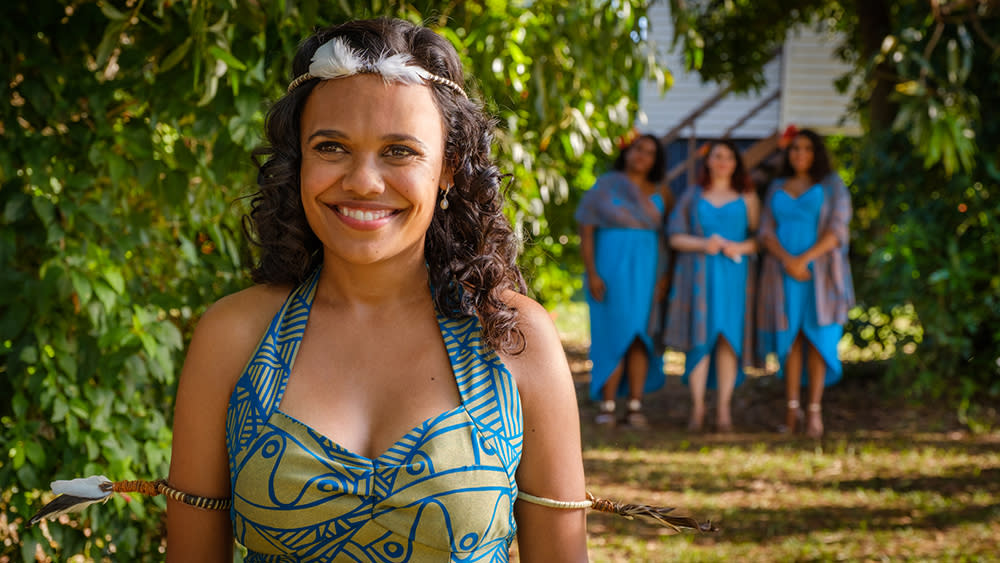Sundance Film Review: ‘Top End Wedding’

The “top end” in “Top End Wedding” refers to the remote Northern Territory of Down Under, where things are done a little differently from what its young townies from bottom-end Adelaide are used to. For all its vibrant indigenous details, however, almost everything else about Wayne Blair’s amiable second feature adheres to universal wedding-comedy formula. The story of an interracial couple encountering the bride-to-be’s estranged Aboriginal roots as they plan a shambolic last-minute wedding, “Top End Wedding” strains for broad farce in its tonally yo-yoing first half, before relaxing into a gentler, more poignant tale of familial bonding as the forestalled but inevitable nuptials approach.
Less snappy and less consistent than Blair’s similarly cheery, culture-crossing domestic smash “The Sapphires,” his latest is unlikely to match that film’s success locally or internationally. Still, it’s easy, attractive comfort viewing that the Northern Territory tourist bureau may as well claim as its own promotional video: Even when the storytelling stalls, the landscape — from the verdant, unspoiled shores of the Tiwi Islands to the craggy, coppery majesty of Katherine Gorge, shot in pristine perma-sunlight by Eric Murray Lui — gives a diverting star turn. The film’s human players aren’t quite as immune to its wobbles, but Gwilym Lee and co-writer Miranda Tapsell are bright, likeably matched leads.
Related stories
Sundance: National Geographic Buys Leonardo DiCaprio-Produced Documentary 'Sea of Shadows'
The Best Films of Sundance 2019
Sundance: Amazon Buys Grand Jury Prize Winner 'One Child Nation' (EXCLUSIVE)
This is something of a passion project for Tapsell, the actress who made a sparky big-screen debut in “The Sapphires.” Taking an associate producer credit and sharing screenplay duties with Joshua Tyler, she has written herself the most nuanced and expansive arc in a story that sometimes hinges on rather abrupt, even irrational character developments. A brief pre-credits prologue, set on the Tiwi Islands in 1976, sets the tone of matrimonial chaos to follow, as young Aboriginal runaway bride Daphne dashes from the church, escaping to the mainland in a motorboat as her family gives chase.
Her story is suspended there, but it doesn’t take long to work out that Daphne is the mother of Lauren (Tapsell), whom we meet in the present day. An ambitious corporate lawyer in Adelaide, readying herself for a major promotion from Hampton (Kerry Fox), her domineering gorgon of a boss, Lauren has drifted far from her quiet upbringing in the northern town of Darwin. (Her failure to answer repeated phone calls from Daphne is held up as a moral red flag; home and its attached values are beckoning.) Meanwhile, her bumbling D.A. boyfriend Ned (Lee, fresh and de-wigged from playing Brian May in “Bohemian Rhapsody”) makes a sudden decision to quit the legal profession — though he fails to inform Lauren of this move before proposing marriage.
The perplexing decisions pile up in the early going, as Lauren immediately asserts that the wedding must take place in the next 10 days, and in Darwin to boot — a set of conditions contrived to place some urgency on what would otherwise be pretty leisurely, low-stakes drama. The nearlyweds touch down in Darwin to find the home fires rudely and recently extinguished: A distraught Trevor (Huw Higginson), Lauren’s white father, has been abandoned by Daphne (Ursula Yovich), who has disappeared on an unspecified journey of self-discovery. Needless to say, one marriage cannot proceed while another hangs in the balance; cue a shift into road-movie gear, complete with a ticking clock, as Lauren and Ned head into the great wide open to find the prodigal mum.
It’s a busy, plotty start to proceedings, not made especially credible by an initial over-reliance on cute, quippy dialogue and clunky physical humor. It’s only once Lauren and Ned hit the road, talking through their own relationship while negotiating another family crisis, that the film starts to breathe a bit, and the young lovers emerge as people rather than types. Though we return sporadically to generic wed-com business back in Darwin — Hampton’s arrival to briskly plan the wedding is the most inexplicable of various logical lapses — a relaxed, more melancholy story of identity lost and found emerges from underneath the neurotic fussing. No prizes for guessing that the answer to both Daphne and Lauren’s quests lies in the motherland; in turn, Blair’s film shifts in mood and tenor as its interest in the calmer, kinder ways of their ancestors comes to the fore.
The final act thus finds a sweet spot between the traditional demands of its genre and other, richer traditions altogether: Its closure hinges as much on mother-daughter union as a confetti-strewn man-and-wife kiss. Yovich is particularly moving as a woman realizing late in life that what once seemed like freedom has closed off other avenues; other, more cartoonish characters fade into the background once the film eventually finds its natural register, and even the lensing and editing soften and unwind as they go. Costume designer Heather Wallace, on the other hand, comes dazzlingly into her own in the later stages, splashing the screen with the crayon-box textiles of the Tiwi Islands — and dreaming up one of the breathtaking bride ensembles in wedding-comedy history. For that alone, “Top End Wedding” merits the RSVP.
Subscribe to Variety Newsletters and Email Alerts!
